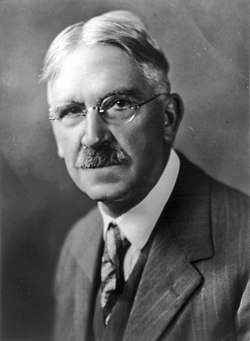John Dewey Quote
Democracy is a way of life controlled by a working faith in the possibilities of human nature. Belief in the Common Man is a familiar article in the democratic creed. That belief is without basis and significance save as it means faith in the potentialities of human nature as that nature is exhibited in every human being irrespective of race, color, sex, birth and family, of material or cultural wealth. This faith may be enacted in statutes, but it is only on paper unless it is put in force in the attitudes which human beings display to one another in all the incidents and relations of daily life. To denounce Nazism for intolerance, cruelty and stimulation of hatred amounts to fostering insincerity if, in our personal relations to other persons, if, in our daily walk and conversation, we are moved by racial, color or other class prejudice; indeed, by anything save a generous belief in their possibilities as human beings, a belief which brings with it the need for providing conditions which will enable these capacities to reach fulfillment. The democratic faith in human equality is belief that every human being, independent of the quantity or range of his personal endowment, has the right to equal opportunity with every other person for development of whatever gifts he has.
Democracy is a way of life controlled by a working faith in the possibilities of human nature. Belief in the Common Man is a familiar article in the democratic creed. That belief is without basis and significance save as it means faith in the potentialities of human nature as that nature is exhibited in every human being irrespective of race, color, sex, birth and family, of material or cultural wealth. This faith may be enacted in statutes, but it is only on paper unless it is put in force in the attitudes which human beings display to one another in all the incidents and relations of daily life. To denounce Nazism for intolerance, cruelty and stimulation of hatred amounts to fostering insincerity if, in our personal relations to other persons, if, in our daily walk and conversation, we are moved by racial, color or other class prejudice; indeed, by anything save a generous belief in their possibilities as human beings, a belief which brings with it the need for providing conditions which will enable these capacities to reach fulfillment. The democratic faith in human equality is belief that every human being, independent of the quantity or range of his personal endowment, has the right to equal opportunity with every other person for development of whatever gifts he has.
Related Quotes
Long before it was known to me as a place where my ancestry was even remotely involved, the idea of a state for Jews (or a Jewish state; not quite the same thing, as I failed at first to see) had been...
About John Dewey
The overriding theme of Dewey's works was his profound belief in democracy, be it in politics, education, or communication and journalism. As Dewey himself stated in 1888, while still at the University of Michigan, "Democracy and the one, ultimate, ethical ideal of humanity are to my mind synonymous." Dewey considered two fundamental elements—schools and civil society—to be major topics needing attention and reconstruction to encourage experimental intelligence and plurality. He asserted that complete democracy was to be obtained not just by extending voting rights but also by ensuring that there exists a fully formed public opinion, accomplished by communication among citizens, experts, and politicians.
Dewey was one of the primary figures associated with the philosophy of pragmatism and is considered one of the founding thinkers of functional psychology. His paper "The Reflex Arc Concept in Psychology", published in 1896, is regarded as the first major work in the (Chicago) functionalist school of psychology. A Review of General Psychology survey, published in 2002, ranked Dewey as the 93rd-most-cited psychologist of the 20th century.
Dewey was also a major educational reformer for the 20th century. A well-known public intellectual, he was a major voice of progressive education and liberalism. While a professor at the University of Chicago, he founded the University of Chicago Laboratory Schools, where he was able to apply and test his progressive ideas on pedagogical method. Although Dewey is known best for his publications about education, he also wrote about many other topics, including epistemology, metaphysics, aesthetics, art, logic, social theory, and ethics.
